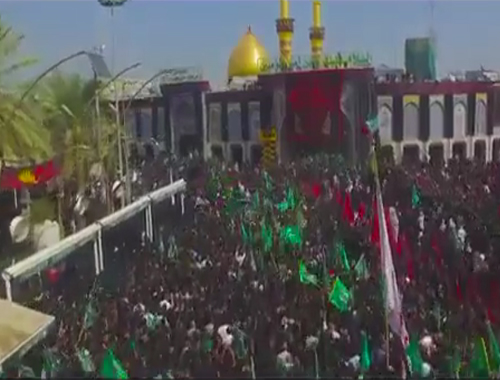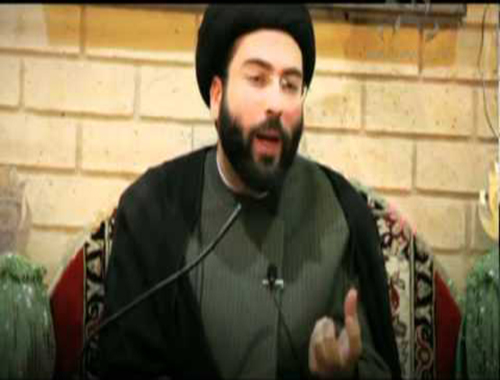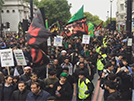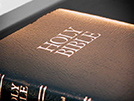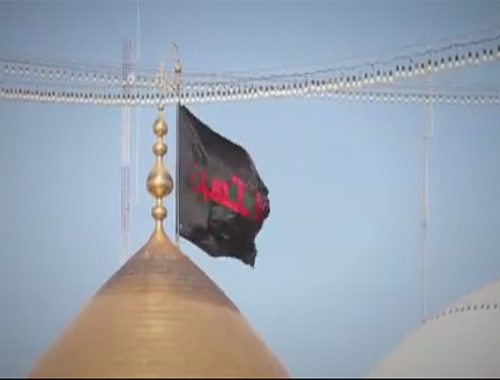19. Confirmation from the Qur'an and the Sunnah
- Details
- Hits: 4445
Confirmation from the Qur'an and the Sunnah
--------------------------------------------------------------------------------
One of the scriptural proofs for the inerrancy of the People of the Prophet's House is the "purification verse" (ayah al-tathir), a verse which depicts their utter purity and their unique character as follow.
"God wishes to remove all filth and impurity from you, O People of House of the Prophet, and to render you utterly free of all pollution." (33:33)
Rijs' translated by us as "filth", has the meaning in Arabic of dirt and impurity, whether it be outer or inner, the latter being essentially synonymous with sin. The word has been used in both senses in the Qur'an. Outer impurity is what is at issue in the following verse: "Carrion, blood that has been shed, and the flesh of the pig all these are filth." (6:145) By contrast, inner impurity is what is meant in this verse: "Those whose hearts are afflicted with sickness will find their filth increased by God so that they ultimately die in a state of unbelief." (9:125)
In the verse which speaks of the removal of filth and impurity from the Prophet's House, the word rijs cannot be interpreted as referring to outer impurity, insofar as all Muslims are required to shun outer impurity as a matter of religious obligation; this is not something that pertains exclusively to the Prophet's House, whereas the verse clearly implies the grant of a particular distinction. Moreover, the avoidance of filth and impurity does not count as a virtue that in the view of the Qur'an characterizes a particular group of people. Given all of this, in order for the verse to be comprehensible. the word rijs must be taken in the sense of inward pollution of the spirit.
God's will and desire to remove all impurity from the People of the Prophet's House is a desire related to the whole scheme of creation, in that God wished that within His created order the members of that house be free of all impurity and adorned with all purity. If we related God's wish to matters of law and legislation, the meaning would simply be that in the sphere of law they should not sin or pollute themselves. This meaning would be clearly unacceptable, for the avoidance of sin and the shunning of impurity is a universal religious duty, the imposition of which does not confer honor or special status on anyone. It would certainly not cause the Prophet, peace and blessings be upon him and his family, to engage in the unprecedented act of gathering together the members of his House behind closed doors and casting a piece of cloth or a cloak (kisa') over them.
The revelation of the "purification verse" aroused a great deal of attention in the time of the Prophet among his Companions, and the select group to whom the verse was addressed and whose sanctity and purity now became a matter of common acceptance were known as the Companions of the Cloak (ahl al-kisa'). Whenever the People of the Prophet's House found it necessary to draw attention to their unique spiritual rank, they would proudly refer to this verse.
At the gathering that was convened after the death of 'Umar to select a caliph, the Commander of the Faithful, 'Ali, peace be upon him, made the following argument:
"Is there any among us apart from myself concerning whom the 'purification verse' was revealed?"
When they answered "no," he proceeded: "The People of the House are overflowing with abundant virtue, for the Qur'an says, 'God wishes to remove all filth and impurity from you, O House of the Prophet, and to render you utterly free of pollution.' (33:33) God has therefore removed from us all evil, outer and inner, and placed us firmly on the path of truth and righteousness." [215]
Ibn 'Abbas reports the following important tradition from the Prophet:
"God Almighty has divided all men into two groups, and placed me among the best of all men. For He said. 'The Companions of the Right Hand how pleasant will be their state!' (56:27), and 'The Companions of the Left Hand, how evil will be their state!' (56:41)
"I am among the Companions of the Right Hand, and I am in fact the best of them.
"Then God divided men into three groups, and again placed me in the purest of them, For He said, 'The Companions of the Right Hand how pleasant will be their state! The Companions of the Left Hand, the wretched, how miserable will be their state! The third group are those foremost in faith, those who are in truth nigh unto Me.' (56:8-11). And I am the best of the foremost.
"Then He divided men into peoples and tribes, and placed me among the best of them. For He said, 'O mankind, We have created you from a single man and woman, and made of you different peoples and tribes in order that you might recognize one another, and the greatest of you in the sigh t of God is the most pious.' (49:13). And I am the most pious and the greatest of mankind, and yet I take no pride in this.
"Then God divided people into families and households, and placed me in the most virtuous of all households. For He said, 'God wishes to remove all filth and impurity from you, O House of the Prophet, and to render you utterly free of pollution.' (33:33) I and my House are, then, utterly free of all impurity and immune to sin."[216]
In this tradition we see that the Prophet, peace and blessings be upon him and his family, has unambiguously interpreted the "purification verse" as referring to inerrancy.
The events that constituted the occasion for the revelation of the verse were the following, as related by Umm Salamah, a wife of the Prophet renowned for her piety and nobility, in whose the events took place:
"One day, Fatimah, peace be upon her, the daughter of the Prophet, brought a dish of food to her father. He told her to summon her husband 'Ali, peace be upon him, and their children, Hasan and Husayn, peace be upon them, which she did. When they were all gathered and engaged in eating, the 'purification verse' was revealed. Thereupon the Prophet took a piece of cloth that he had on his shoulders and cast it over their heads, saying three times, 'O Lord, these are the People of my House; remove filth and impurity from them and render them utterly pure.'" [217]
Many Sunni scholars remark that the "purification verse" was revealed concerning five people: The Prophet, 'Ali, Fatimah, Hasan, and Husayn. [218]
'Umar b. Abi Salamah who was a witness to the incident described it as follows:
"The 'purification verse' was revealed in the house of Umm Salamah. Then the Prophet, peace and blessings be upon him and his family, told 'Ali, Fatimah, Hasan, and Husayn to approach him and threw over their heads a piece of cloth that was covering his shoulders, and said, 'These are the People of my House; remove from them all filth, and render them utterly pure.' Umm Salamah then asked, 'O Messenger of God, am I also one of them?' He replied, 'Be content with your. Own place, for you are one of the virtuous."' [219]
A'ishah relates: "One day the Prophet left the house, with a piece of cloth slung over his shoulders. Hasan, Husayn, Fatimah, and 'Ali came to see him, and he threw the cloth over their heads, reciting the, purification verse.' [220]
Abu 'l-Hamra', one of the Companions, relates: "I stayed in Madinah for eight months, watching the Prophet constantly. He would never leave his house to perform the prayers without first passing by 'Ali's house. He would place his hands on each side of the door and cry out, 'Prayer Prayer'! God wishes to remove all filth from you, People of the House, and to make you utterly pure!'" [221]
Only a few people witnessed the Prophet, peace and blessings be Upon him and his family, casting his cloak over the People of the House, so in order to disseminate news of it as broadly as possible among the people and convey make them aware of the standing of his progeny, for them in turn to convey it others, he repeated this procedure for an extended period. Ibn Abbas relates that for a period of nine months, whenever the Prophet passed by the house of 'Ali, peace be upon him, he would call out: "Peace be upon you, O People of the House!" and then he would recite the: "purification verse." [222]
Anas b. Malik similarly relates: "For a period of six months, whenever the Messenger of God, peace and blessings be upon him and his family, passed by the house of Fatimah, peace be upon her, at the time of the dawn prayer, he would say, 'Rise for prayer, O People of my House!' Then he would recite the 'purification verse'." [223]
The Commander of the Faithful 'Ali, peace be upon him, relates: "Every morning when the Most Noble Messenger passed in front of our house, he would say, 'God's mercy be upon you, rise for prayer!' Then he would recite the 'purification verse'." [224]
Some people maintain that the "purification verse" cannot refer to the inerrancy of the Imams because the context in which it occurs relates to the wives of the Prophet and necessitates that it, too, should refer to them, or that at the very least they cannot be excluded from the category it addresses; if it were to imply inerrancy, then the wives of the Prophet would also have to be inerrant, a belief that no one holds. We must therefore interpret the verse as referring to the wives of the Prophet, not to their putative inerrancy or that of the other members of the Prophet's house.
This objection is groundless, and incompatible with the wording of the verse. For if it had been intended to address the wives of the Prophet, the second person feminine plural would have been used, not the second person masculine plural ('ankunna instead of 'ankum, yutahirakunna instead of yutahirakum).
In addition, the traditions that we have cited clearly demonstrate that only four people are meant by the expression People of the House, for the Messenger of God says: "O God, these are the People of my House." In the lifetime of the Prophet, membership in his house was restricted to the four named individuals. As for his wives and other relatives, including even Ja'far b. Abi Talib and his uncle al-'Abbas, none of them belong to the category of his house.
Furthermore, many other traditions mention clearly the occasion for the revelation of the verse.
When Umm Salamah, Zaynab, and 'A'ishah asked the Most Noble Messenger, peace and blessings be upon him and his family, whether they too were part of the People of the House (Ahl al-Bayt), he told them to be content with their station and not to attempt to draw close.
There is no problem in regarding the "purification verse" as a parenthetic statement inserted in the verses dealing with the wives of the Prophet, for such recourse to parenthesis is by no means contrary to good usage and is also found elsewhere in the Qur'an.
Finally, purification (tathir) is synonymous here with inerrancy ('ismah), and according to the unanimous opinion of all traditionists and historians the wives of the Prophet did not possess the lofty attribute of inerrancy. They frequently vexed the Prophet, peace and blessings be upon him and his family, during his lifetime, and matters once reached such a pitch that the Prophet shunned some of them for a whole month and threatened them with divorce. Worse than all of this, the Messenger of God, peace and blessings be upon him and his family, was standing one day with a group of his Companions near the door to the house of one of his wives, and pointing in its direction he said: "This is where trouble starts." [225]
Taking all this into consideration, how can the wives of the Prophet be regarded as covered by the "purification verse"?
In addition, there are numerous traditions specifically proclaiming the inerrancy of the Imams.
Thus Ibn Abbas reports the Prophet to have said:
"I, 'Ali, Hasan, Husayn, and nine descendants of Husayn, are inerrant and pure." [226]
Salim b. Qays records the Commander of the Faithful, 'Ali, peace be upon him, to have said:
"Obedience is incumbent only to God, the Messenger and the Holders of Authority (ulu'l-amr). It is obligatory to follow the Holders of Authority because they are inerrant, far removed from all sin, and they issue no command contravening God's law." [227]
He also said: "Why are you bewildered and confused in your attempts to find the right path? The Prophet's progeny is among you; they are guides to the truth, the banners of religion, and the tongues of honesty and veracity. Place them on the same level as the Qur'an, and hasten to them as the thirsty rush toward water." [228]
Imam al-Rida, peace be upon him, said: "The Imam is a personage who is free of all sin, major and minor, devoid of all faults, and replete with knowledge." [229]
Imam al-Sadiq, peace be upon him, said: "The prophets and their successors are sinless and pure, for they all possess inerrancy." [230]
He expressed the same matter in the following more detailed form: "The Imam is a unique figure, elected by God. He is men's guide to God Almighty; the one who arises in order to plant hope in men's hearts; the one chosen by God who nurtured by Him arises first ill the world of the particle and then in the created universe. He was situated to the right of the divine throne in phantasmal form before the creation of all animate life, and learned knowledge and wisdom from the world of the unseen, on account of which he was appointed Imam and selected as one of the pure.
"The Imam is the choice off spring of Adam and Nuh, the select descendant of Ibrahim, the quintessence of the progeny of Isma'il, the foremost of the line of Muhammad. God Almighty shows him particular concern, for He guards and protects him with His most sacred essence. The wiles of Satan are warded off from him; the tenebrous temptations of the evildoers have no effect on him. He is immune to all reprehensible conduct, devoid of all faults and defects, and protected against the commission of error. He is never polluted by evil, and is celebrated for his steadfastness, virtue, knowledge and chastity from the very beginning of his maturity". [231]
Abu Sa'id al-Khudri reports the Prophet, peace and blessings be upon him and his family, as saying:
"O people, I am leaving among you two great and precious trusts; if you hold fast to them, you will never go astray. One of the two is greater than the other, and that is the Book of God, for that is the link between the earth and the heavens. The second is my progeny the People of my House; know that my progeny and the Qur'an shall never be separated from each other until the Day of Resurrection." [232]
This is the well-known hadith of the two precious trusts (thaqalayn), which has been cited by both Shi'i and Sunni scholars in their books of tradition, with numerous chains of transmission. A number of points can be deduced from this tradition of indubitable authenticity.
First, the deeds and conduct of the Inerrant Imams must be regarded as exemplary and demanding of imitation; failure to do so will lead to misguidance. This can be true only if their steps never deviate in the direction of error or sin and they are in an unvarying state of inerrancy. Were it to be otherwise, the ummah would fall into the whirlpool of perdition by following them, whereas the Prophet categorically declares that whoever follows his progeny will not go astray. They are Islam personified, and their conduct is the example the whole ummah must follow and implement in their everyday lives.
Second, the Prophet, peace and blessings be upon him and his family, declares that the Qur'an and his progeny ('itrah) shall never be separated until the Day of Resurrection, so that just as the survival of the Qur'an is guaranteed until the Day of Resurrection, the earth will never be without an Imam.
Third, the People of the House constitute, from the point of view of the Prophet, an authority and a source of learning for all Muslims, irrespective of the historical circumstances under which they live; reference should therefore be made to them in order to learn the ordinances of God's religion.
The eighth Imam, al-Rida, peace be upon him, says:
"Whenever God chooses someone to administer the affairs of His servants, He expands his breast for him and makes of his heart a repository of wisdom. Incessantly He inspires him with knowledge, and there is no question he is unable to answer. He is never uncertain of the correct path, and through his inerrancy he is pure of all sin and rebellion. He is sustained always by God, and succeeds always in traversing His path. Error and sin cannot touch him. God it is Who has bestowed this exalted station on him, so that he might be a proof to His servants and a witness to His creation. This is generosity that God bestows on whomsoever He wills from among His servants, and God's generosity is great." [233]
Finally, let us draw attention to a possibility that Allamah Sharaf al-Din has raised:
"Although we are convinced that no distortion has taken place in the verses of the Noble Qur'an and that our heavenly Book has not been tampered with in any way, it is by no means clear that the arrangement and recension of the verses is precisely that in which they were revealed. For it is quite possible that the 'purification verse' concerning the People of the House was revealed separately and then, when the verses of the Qur'an were being assembled, was placed in the middle of the verses relating to the wives of the Prophet, either in error or deliberately." [234]
Notes:
[215] al-Bahrani, Ghayat al-Maram, p. 295.
[216] al-Suyuti, al-Durr al-Manthur, Vol. V, p. 199.
[217] al-Qunduzi, Yanabi' al-Mawaddah, p. 125.
[218] Ibid., p. 126; al-Suyuti, al-Durr al-Manthur, Vol. V, p. 199; Ahmad b. Hanbal, al-Musnad, Vol. I, p. 331; Fakhr al-Din al-Razi, al-Tafsir al-Kabir, Vol. I, p. 783; al-Suyuti, al-Khasa'is al-Kubra, Vol. II, p. 264; Ibn Hajar, al-Sawa'iq, p.85.
[219] Ibn al-Athir, Jami' al-Usul, Vol. I, p. 101; al-Muhibb al-Tabari, Riyad al-Nadirah, Vol. II, p. 269; al-Haythami, Majma' al-zawa'id, Vol. IX, pp. 119, 207.
[220] al-Qunduzi, Yanabi' al-Mawaddah, p. 124.
[221] al-Suyuti, al-Durr al-Manthur, Vol. V, p. 198; Ibn al-Athir, Usud al-Ghabah, Vol. V, p. 174; al-Haythami, Majma' al-zawa'id, Vol. IX, p. 168.
[222] al-Ganji, Kifayat al-Talib, p. 232; Asad Haydar, al-Imam Ahmad b. al-Sadiq wa al-Madhahib al-Arba'ah, Vol. I, p. 89. Hanbal, al-Musnad, Vol. I, p. 330; al-Nasa'i, al-Khasa'is, p. 11; al-Muhibb al-Tabari, Riyad al-Nadirah, Vol. II, p. 269,. al-Haythami, Majma' al-zawa'id, Vol. IX, pp. 119, 207.
[223] al-Tirmidhi, Jami' al-Sahih, Vol. 11, p. 308; al-Hakim, al-Mustadrak, Vol. 111, p. 158; Ibn Kathir, al-Bidayah, Vol. III, p. 438; Ibn al-Sabbagh, Fusul al-Muhimmah, p. 8; al-Tabari, al-Tafsir, Vol. XXII, p. 5; al-Suyuti, al-Durr al-Manthur, Vol. V, p. 199; al-Muttaqi al-Hindi, Kanz al-'Ummal, Vol. VII, p. 102; Ahmad b. Hanbal, al-Musnad, Vol. III, p.286.
[224] al-Bahrani, Ghayat al-Maram, p. 295.
[225] al-Bukhari, al-Sahih, Vol. II, p. 189.
[226] al-Qunduzi, Yanabi' al-Mawaddah, p. 534.
[227] Hurr al-'Amili, Ithbat al-Hudat, Vol. I, p. 232.
[228] al-Radi, Nahj al-Balaghah, Sermon 83.
[229] al-Kulayni, al-Kafi, Vol. I, p.200.
[230] al-Majlisi, Bihar al-anwar, Vol. XXV, p. 199.
[231] al-Kulayni, al-Kafi, Vol. I, p.204.
[232] al-Qunduzi, Yanabi' al-Mawaddah, p.36; al-Tirmidhi, Jami' al-Sahih, Vol. V, p.329.
[233] al-Kulayni, al-Kafi, Vol. I.
[234] Sharaf al-Din, Kalimat al-Ghurra', p.213.

